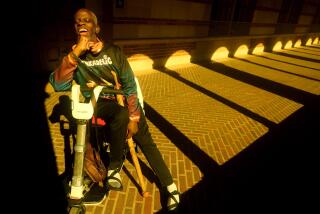Answering the Prayers of the Deaf : Religion: A pioneering program at Fuller Seminary in Pasadena will train hearing-impaired spiritual leaders to minister to their brethren.
- Share via
Kwang Kim’s God simply would not relent.
An ambitious, intelligent man, Kim had come from Korea to Portland, Ore., leaving behind a country where his deafness was labeled as “dumbness.” Life in America held two college degrees and a new level of acceptance.
Yet through the dramatic shift, there was a calling he didn’t know how to answer.
“When I moved here, I wasn’t thinking of Bible college,” said Kim, 33. “But God really touched my heart, [and] I wanted to minister. God never forgot that. He kept touching me again and again.”
The prayers of the deaf may travel upward in unhindered silence, but becoming “churched” for the deaf is another matter. They flock to the comparably few churches where sermons are translated into sign language and pay thousands to finance interpreters for Bible classes.
Now they are trickling into Pasadena’s Fuller Theological Seminary, where a landmark program is set to offer them a master’s degree in theology. Complete with what is believed to be a first-ever concentration in deaf ministry, the visionary program will train an elite group of deaf spiritual leaders to minister silently to their brethren’s distinct needs.
“It’s amazing that this is happening,” said sign-language interpreter Vickie Hosteller, who works with the students. The deaf constitute “a population that really needs to be served in this matter. I’ve been waiting for a job like this for many, many years.”
The first deaf pupils have begun arriving at the tree-studded campus in Pasadena. Already, their gesticulations are a blur of enthusiasm for a life-altering program that, at long last, will speak directly to them.
“Without a program, we would have to suffer through something else,” Kim said. Now “I will work as a leader to deaf [people] around the world.”
The inaugural class, set to start in September, will complete course work in two years. The cluster of deaf students will attend mainstream theological classes and also enroll in pioneering courses on deaf ministry and teaching.
“It’s time the church woke up and started offering Christian higher education for the deaf,” said William Erickson, an Oregon-based pastor who leads Gospel Ministries for the Deaf, a small outreach group. “We have limited them . . . by not providing training.”
If church ceremonies and traditions aren’t adapted to accommodate their disability, deaf parishioners are left only with the simple tasks of laymen, according to Hosteller.
“Deaf people are saying in the back of their minds, ‘How do I relate?’ ” said deaf student Darren Russell, 23, who started studying at Fuller after graduating from Arizona State University. “It takes a lot of theology to do it, and that’s why I’m here: to solve the problem.”
While hearing-able ministers can work with the deaf, close ministerial work requires further dedication, Hosteller said.
“You can’t just get up on Sunday morning, preach a sermon and then not see the deaf for the rest of the week,” she said. “It involves the whole church life.”
“To them, hearing God is feeling God,” she said. “It’s a feeling that comes to your heart and an openness of your spirit.”
The unique course work is the culmination of a nationwide, years-long search by Erickson. The search ended when Fuller agreed to take on the pilot program last year. Teachers were contracted, Hosteller was hired and Erickson began crisscrossing the country in search of about 15 interested students. Kim and Russell are his first and only recruits.
“I tell people I’m looking for needles in the haystack,” Erickson said. But “we have already had inquiries from India, Japan and the Philippines.”
If grants and donations become steady, the program will add more courses and interpreters, Erickson said.
Merely adding an interpreter to spiritual lectures doesn’t fulfill the deaf’s needs, according to Hosteller. Their culture, she said, has “mores and norms and values of its own.”
More to Read
Sign up for Essential California
The most important California stories and recommendations in your inbox every morning.
You may occasionally receive promotional content from the Los Angeles Times.













